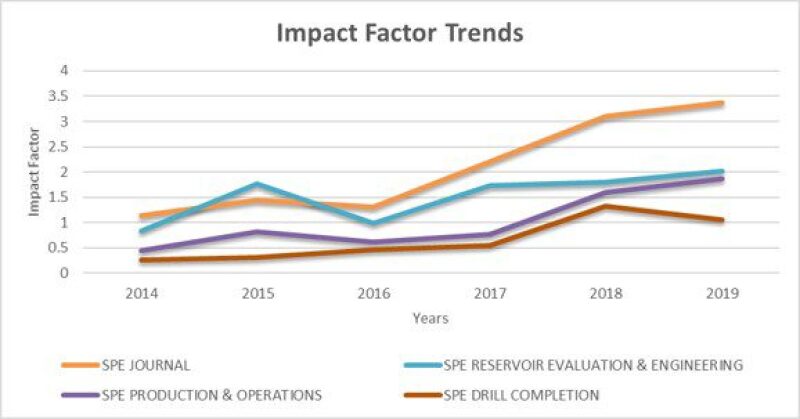SPE’s mission as a journal publisher is to provide readers with content they can trust on cutting-edge solutions and technical advances in the oil and gas field. SPE also understands the value to researchers to publish in a well-respected journal and to get their research out there quickly. We are pleased to say that in 2020 SPE continues making great strides in every aspect of scholarly publishing.
Impact and Speed
Clarivate Analytics released the 2020 Journal Citation Report (JCR) in June and once again it reflects a positive trend for SPE journals in the most recent impact factors: SPE J (3.372), SPE Res Eval & Eng (2.013), SPE Prod & Oper (1.875), and SPE Drill & Compl (1.053). While it is important not to overly depend on impact factors for research assessment, the JCR has a reputation of excellence and integrity for its meticulous selection of top journals.

Being selected for inclusion Clarivate's Science Citation Index Expanded and Elsevier’s Scopus citation database helps enhance the discoverability of SPE’s knowledge and raise the profile of oil and gas research. In Scopus’ latest CiteScore rankings, SPE Journal ranked No. 4 out of 189 journals in Geotechnical Engineering and Engineering Geology (placing it in the 98th percentile for its subject area).
In addition to enhancing the impact of our journals, one of our goals was to make the review process more efficient and fairer to authors. Thanks to the efforts of our volunteer reviewers, editors, and staff, as of July 2020 we have successfully reduced the average time from submission to initial decision to 30 days (including initially declined papers). This fantastic accomplishment represents a 50% improvement year to date.
Top SPE Papers Researchers Are Citing
We invite you to read just a few of the top cited papers across the SPE’s peer-reviewed journal portfolio which showcase new methods and technology that are impacting research today.
Investigation of Rupture and Slip Mechanisms of Hydraulic Fractures in Multiple-Layered Formations (SPE-197054-PA)
History Matching the Full Norne Field Model Using Seismic and Production Data (SPE-194205-PA)
SPE Reservoir Evaluation & Engineering
Lessons Learned From Alkali/Surfactant/ Polymer-Flooding Field Tests in China (SPE-186036-PA)
Analyzing the Well-Interference Phenomenon in the Eagle Ford Shale/Austin Chalk Production System With a Comprehensive Compositional Reservoir Model (SPE-191381-PA)
A Robust Model To Simulate Dolomite-Matrix Acidizing (SPE-191136-PA)
New Insights on Mechanisms Controlling Fracturing-Fluid Distribution and Their Effects on Well Performance in Shale-Gas Reservoirs (SPE-185043-PA)
A Mathematical Model for Predicting Long-Term Productivity of Modern Multifractured Shale-Gas/Oil Wells (SPE-194495-PA)
Well-Collision-Avoidance Separation Rule (SPE-187073-PA)
If you haven’t already, consider subscribing to SPE’s journals to unlock a wealth of knowledge from across industry and academia.
Expanded Resources for Authors
SPE is pleased to offer a 20% discount to member authors seeking language-editing services from Editage. Non-SPE authors can still receive a 10% discount for the services offered. Use the links below to learn more about our discounted editing services partnership. Interested in being a member of SPE?
A variety of additional new resources have also been established to help streamline the publication process for authors—from figure preparation guidelines to article templates. Visit the author resource center today and access the latest information needed to publish with SPE and contribute to the knowledge and future of the oil and gas industry.
Learn more about SPE’s peer-reviewed journals
Interested in Publishing in an SPE Journal?
Our team would love to hear from you. Please direct questions or comments about SPE’s peer-reviewed journals to Dawit Tegbaru, managing editor, or email peer@spe.org.
